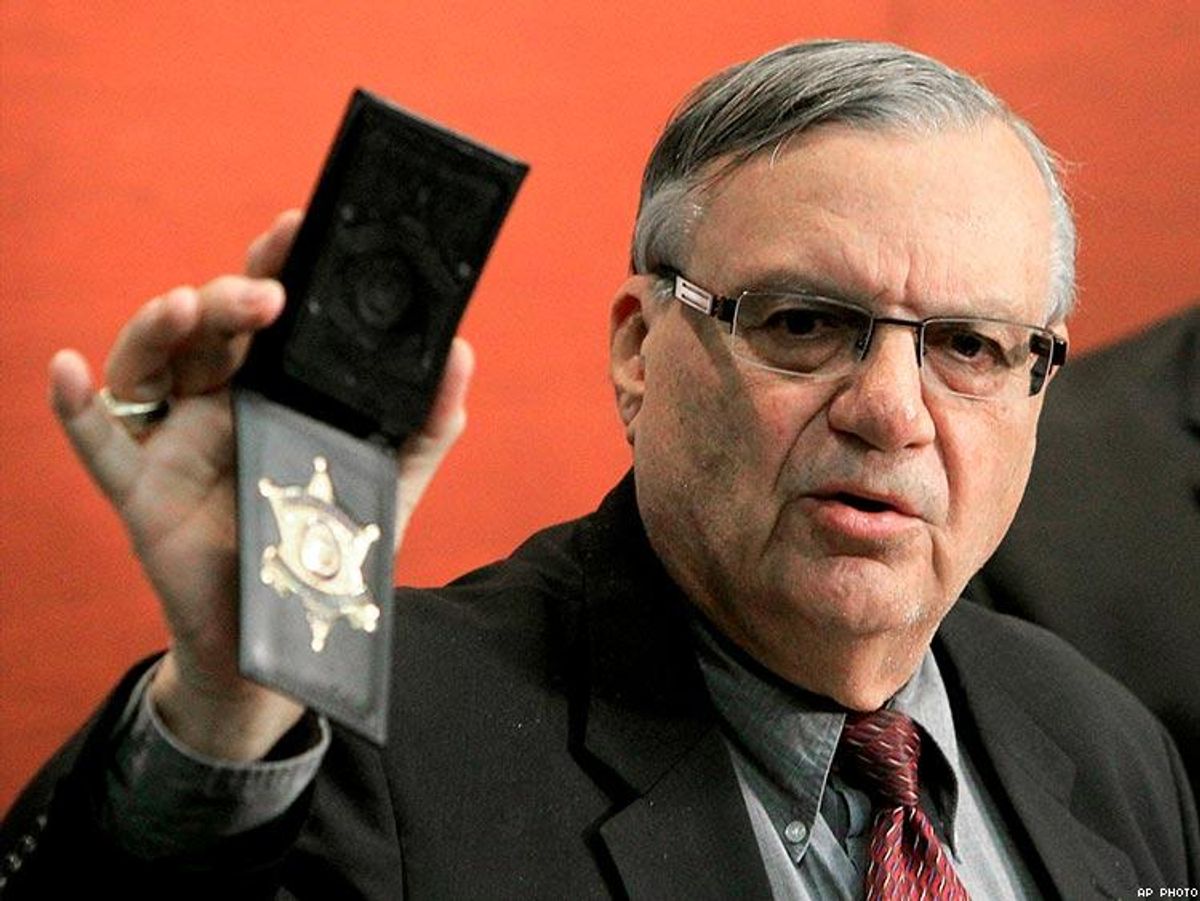While Donald Trump has issued a pardon to former Maricopa County, Ariz., Sheriff Joe Arpaio for his contempt of court conviction, the judge who convicted him says not so fast.
U.S. District Judge Susan Bolton announced Tuesday that she wants to hear oral arguments from both sides in the case before deciding whether to throw out the conviction, The Arizona Republic reports. The sides are Arpaio and his attorneys, and the U.S. Department of Justice, which prosecuted the case.
"There is case law that says a pardon implies an admission of guilt, and that will have to be argued in open court," the paper explains. Bolton set oral arguments for October 4, the day before Arpaio was scheduled to be sentenced, and canceled the sentencing hearing.
"We look forward to the hearing, and hope that the court will make the appropriate ruling," Mark Goldman, one of Arpaio's attorneys, told the Republic. "The verdict should have been set aside by the court already and prior to the pardon for the reason that it was never delivered to Sheriff Arpaio in open court, but instead sent to his attorneys via email, thus violating his constitutional rights to a public trial and to participate in his trial." Arpaio's attorneys had filed a motion saying Trump's pardon, announced Friday, renders the case moot, but Bolton deferred action on that. His lawyers said that if Bolton does not vacate Arpaio's conviction, they will appeal.
Bolton convicted Arpaio in July of defying a court order that he stop his department's raids of largely Latino neighborhoods in search of undocumented immigrants. His deputies would often detain people for minor violations and then check their immigration status. The order was issued in 2012 by another judge, who said Arpaio and his deputies did not have authorization to enforce federal immigration law. A year earlier, the Justice Department had found that the raids amounted to racial profiling.
Arpaio and his attorneys have objected to media reports that he was convicted of racial profiling. "It's not just TV, it's elected officials," he told the Republic Monday. "You've got one guy here ... calling me a racist, calling the president a racist. You've got others saying I was charged of racial profiling. That's untrue ... and my lawyer is concerned with these derogatory, slanderous statements that are going around."
Arpaio, however, had lost a civil lawsuit, brought by the American Civil Liberties Union, alleging racial profiling. The criminal contempt claim was separate, but Latino rights activist Mary Rose Wilcox told the paper, "No matter how he tries to cover up the words, racial profiling was the underlying cause in both the civil and criminal charges."
Arpaio, 85, was sheriff of Maricopa County from 1993 until last year, when he finally lost a race for reelection. The county is Arizona's most populous and includes the city of Phoenix. In addition to the immigration raids, he became infamous for erecting a "tent city" outdoor jail where inmates endured the intense Arizona summer heat, and for ignoring sex crime cases. He has been a major Trump supporter and spoke on his behalf at the Republican National Convention.
Meanwhile, a group called Protect Democracy and several lawyers have sent a letter to Raymond N. Hulser and John Dixon Keller of the Public Integrity Section, Criminal Division of the Justice Department, arguing that Trump's pardon of Arpaio "goes beyond constitutional limits," The Washington Post reports.
"While the Constitution's pardon power is broad, it is not unlimited," they wrote, noting that "issuance of a pardon that violates the Fifth Amendment's Due Process Clause is ... suspect." Courts must be able to stop public officials from violating constitutional rights, the letter said.
"In other words, if the president can pardon anyone who defies court orders to enforce constitutional protections, then those constitutional protections are rendered meaningless," wrote Post commentator Jennifer Rubin. "It is a creative argument, but then, this president has created new and disturbing challenges to democratic norms." There is also concern, according to Rubin, about "the potential for Trump to pardon associates involved in the probe of possible collusion between the Trump campaign and Russian officials and the possible obstruction of justice that followed."

















































































